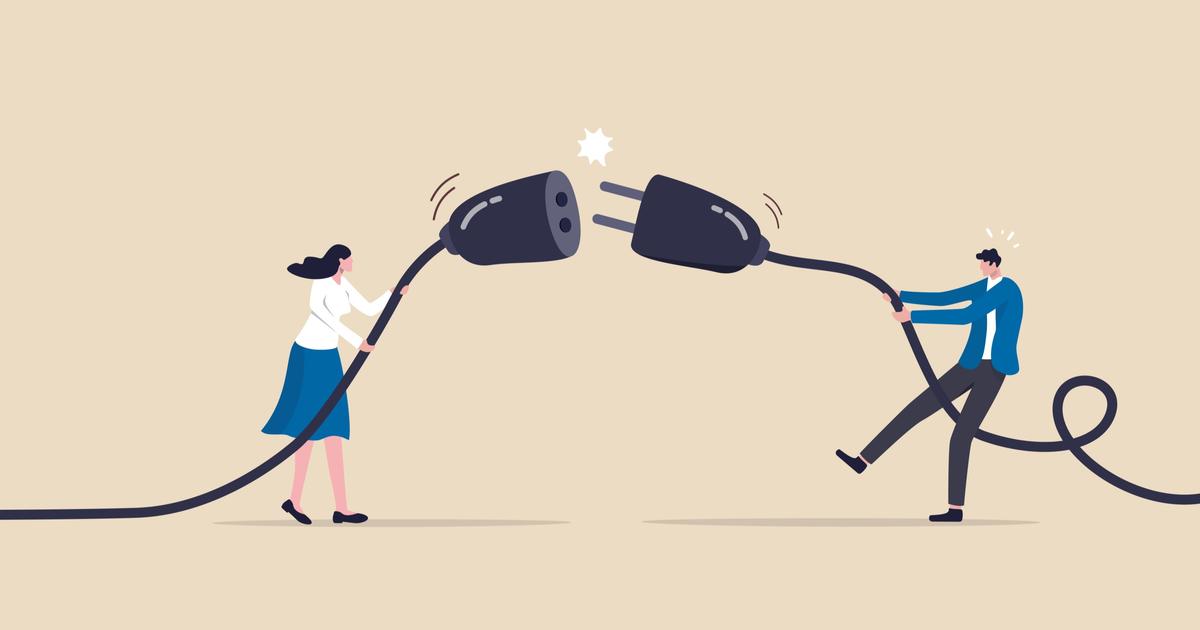“We had been dating for a few weeks.
One day, entwined in front of the TV, he said when he saw Nicolas Sarkozy on the screen: “That's a leader!”.
I burst out laughing, but he remained very serious.
That's when we knew we didn't have the same political opinions at all, ”says Floriane, 30, in a relationship with Yacine, 28.
In the first round of the last presidential elections, in 2017, she voted for Jean-Luc Mélenchon (La France Insoumise).
He voted for François Fillon (Les Républicains).
In the next elections, she does not yet know to whom she will give her vote.
“Why not Yannick Jadot (Europe Ecologie Les Verts)”, she wonders, not yet decided.
His companion, he thinks to choose Emmanuel Macron if he represents himself.
Read alsoAs a couple, can we be happy with different life projects?
Corinne, 56, who voted for Benoît Hamon (Socialist Party) in 2017, already knew that her companion was "right-wing" when they got together.
He voted for François Fillon at the time.
“It was not a surprise, but I said to myself 'too bad, it will be less easy,' she confides.
Then we said to ourselves laughingly that at the time of the elections there would always be an unfortunate person in the house.
Like Floriane, Yacine and Corinne, many couples know that they will not put the same ballot in the ballot box during the presidential elections on April 10 and 24.
In 2017, 16% of people questioned by an IFOP poll declared that they adhered to a political side different from that of their spouse (1).
A subject of tension, or even a cause of rupture?
No, up to a point.
In video, the 10 secrets of couples that last
Take care of communication
Political divergence does not necessarily lead to dispute.
“We discuss, specifies Floriane.
We know how to communicate and we manage to understand the other's point of view.
But we also know when to stop talking, like when the conversation is going in circles, for example.
As long as you can trade, it's pretty rich.
But I also know that we can live without necessarily talking about certain subjects.
Knowing how to communicate would therefore be the key: obvious for everyone, but to which special care must be taken when one has different, even diametrically opposed political ideas.
"There are no moral values that allow a priori to standardize the life of the couple, except one: freedom of speech", deciphers Pierre Zaoui, philosopher and lecturer at the University of Paris (2).
According to him, "a living couple is
that is to say, a couple who is neither in perpetual war nor in silent fusion, is so because they are able to talk to each other, and to talk to each other without ever being too afraid of misunderstandings and misunderstandings .
On the other hand, the couple in crisis is always the couple who no longer know how to talk to each other at all, who do not even chat.
A living couple is so because they are able to talk to each other, and to talk to each other about themselves without ever being too afraid of misunderstandings and misunderstandings.
Pierre Zaoui
Be enriched by the difference
But even at the heart of the most respectful of debates, how not to try to convince the other of the correctness of his ideas, at the risk of Homeric conflicts, such as are feared at family dinners?
Here again, it is a question of finding a subtle balance.
“Living with someone on the right when I'm on the left hasn't changed my political opinions, but it challenges my convictions, testifies Corinne.
I realized that the political side to which I adhere does not provide answers for everyone, and that perhaps something else needs to be found.
My view of things is less binary, I feel like I'm more open-minded."
"To be enriched by the difference is specific to the couple", explains Caroline Kruse, marriage counselor.
No need to try to erase the differences, and the divergences, of each one.
Household peace does not depend on the fusion of partners.
“We are always three in a couple, adds the therapist.
Oneself, the other and the couple.
This third element is made up of adjustments, compromises and efforts.
But that does not prevent him from keeping his individuality.
You can keep a personal zone in addition to a common zone.
In some couples, the difference even goes so far as to have an erotic effect, and brings spice to the relationship.
“Political disagreement can play this role of spice and incorporate a saving ingredient into the kitchen of love.
Because boredom awaits harmony,
Getting along before starting a family
It does not matter if you discuss politics for hours with your spouse, the choice of the candidate for whom you vote is made individually.
The question becomes more delicate when it interferes in the projects that we have in common.
Especially when they concern the family and the education of children.
“Without making it a major issue,” Caroline Kruse advises talking about these differences before deciding to become parents.
"Without wanting to settle everything in advance, we can try to agree on what seems essential, such as the fact of schooling the child in a public or private establishment and the type of education we want. give,” she says.
The therapist remembers a couple of young parents who came to see her for a consultation.
"The birth of their child revealed a problem that had been hidden until then: the choice of where to live," she recalls.
The husband wanted to stay in Paris, while his wife, a convinced ecologist, could no longer imagine living and raising her children elsewhere than in the countryside.
They ended up breaking up."
Emmanuel and Brigitte Macron celebrate their 10 years of union
In images, in pictures
See the slideshow25 photos
See the slideshow25 photos
Values, essential common ground
“The most important thing is not to agree in politics, but to agree on values,” explains Anne Muxel.
Those that we have pegged to the body and that have always determined our relationship to others and to the world.
“The more the conflicts come under politics stricto sensu, the more they can put up with disagreement.
But the more they engage existentially embodied values, the more they appear difficult to reconcile in intimacy”.
It is this "common foundation of immutable values" that has ensured that Corinne and her partner overcome their political disagreements.
First and foremost, there is respect for otherness and the fight against racism and homophobia.
But also, the importance given to work, health and education,
The most important thing is not to agree in politics, but to agree on values
Anne Muxel
The far-right red line
However, there is a border beyond which dialogue can become impossible.
In the study she conducted on the place of politics within the couple, sociologist Anne Muxel reveals that a disagreement in particular acts "for most of (her) respondents, as a limit threshold which could not be crossed : the extreme right".
This is also reflected in the testimonies collected for this article.
"Even if he has no intention of voting for the far right, when he tells me that it would be worth listening to what the National Rally has to offer, that's where the debate turns. stop,” says Corinne.
“There are some things I can be flexible on and others not at all.
For me, the far right is too much, ”she asserts categorically.
Vibrating to the sound of Jean-Luc Mélenchon's voice while the loved one swears by Valérie Pécresse, going through political programs that he does not even deign to watch does not therefore constitute an obstacle to the couple.
And can perhaps serve as the basis for a loving dialogue that allows, over long conversations, to rediscover the other, to understand him better and to question his own convictions.
Provided you want it.
Because above all, and as the philosopher Pierre Zaoui reminds us, love is a matter of desire and "desire is not about opinion."
1. IFOP survey, “Sex, couple and politics: Do the French vote like their spouse?”
2. Pierre Zaoui,
Théorie du couple
, in the magazine Le Crieur
3. Anne Muxel,
You, me and politics.
Love and convictions
, Seuil editions, 288 pages.








